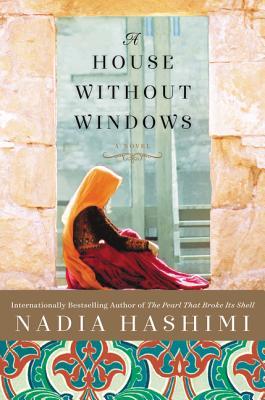Marriage was a sport. One point for love, one point for hate. The heart kept score.A House Without Windows was urged on me as a fine example of social justice fiction (by someone who says she never reads nonfiction and therefore found this to be really informative and moving), and while I'd certainly agree that shining a light on injustice around the world is an admirable goal, I expect a novel to also have well-developed characters and plot, along with strong sentence-by-sentence writing, and I just don't think this book rises to the level of a “great” novel. On the other hand, if this book does affect other readers – and especially if it prompts even one person to try and change the world for the better – then it has value beyond the page.
Set in a small village in Afghanistan, the book starts with a violent crime: when three young children return home from school, they find their father dead and their mother, Zeba, covered in blood. Frozen with shock and fear, Zeba is unable to explain what happened, and she is quickly arrested for murder and sent away to a women's prison. This soon feels like a McGuffin (and I understand I'm really stretching the definition of that term) because while Zeba's situation isn't black and white (apparently even she isn't really sure what happened in the courtyard that fateful day), she meets dozens of women who explain to her the “moral” infractions that they are serving long prison sentences for: meeting a male coworker for an unsupervised picnic; becoming pregnant from a rape; running away from physically abusive parents. While Zeba's particular case and its resolution is the heart of the book, it feels like these other women – and the helpless picture that they paint for the lives of all Afghani women – is really the point; but isn't their plight actually kind of well known? Several times, characters note a real case from the nightly news, and those cases made the news here, too.
A woman's worth was measured, with scientific diligence, in blood. A woman was only as good as the drops that fell on her wedding night, the ounces she bled with the turn of the moon, and the small river she shed giving her husband children. Some women were judged most ultimately, having their veins emptied to atone for their sins or for the sins of others.Interspersed with Zeba's story, we also meet Yusef: born in Afghanistan, his family fled to America when he was a boy. After studying Law and becoming interested in social justice issues, Yusef decided to return to the country of his birth to represent hopeless causes; he becomes Zeba's lawyer. I appreciate the use of this character to see behind the curtain of Afghani jurisprudence – and especially as he is both an insider and an outsider – and this character proves how hard it is to apply Afghanistan's new legal code at the village level. On the other hand, subplots about his love life felt peripheral.
Yusef was young and inexperienced, she knew. He had noble intentions, the noblest intentions Zeba had ever seen, but intentions accomplished little in Afghanistan. Guns, money, power, pride – these were the currencies of the country. That glint in his eye the last time they'd spoken had only made him look pathetic to his client – like a child who'd spotted a toy in a minefield.A House Without Windows is partially a domestic novel as we learn all about Zeba's extended family as well as her marriage, and as for her dead husband, Kamal, we only learn about him in retrospect; all tell, no show:
Kamal was one of those men who needed to exert his strength to reassure himself he was capable of something. He needed to see his wife and children react to his presence to confirm he was in command. A man's might was right because no one had ever told him otherwise. And Kamal had secrets, filthy shameful secrets. When he was inebriated, or angry or preoccupied, he was quite able to forgive his sins. But there were rare moments, small awakenings of a deeper conscience he didn't much care to face. In these moments, Kamal's face would flush with shame, his spine would hunch with horror. It was unbearable. Kamal could not tolerate anyone pointing out even the smallest of his shortcomings because he sensed that it would undo him completely, in the way that pulling on a stray piece of yarn just so can turn a sweater back into a pile of string.And for that matter, much information is shared (by the semi-omniscient narrator) in a clunky manner:
For a family to give up their claim on a girl was unusual, even if the government had outlawed the practice of baad, giving daughters to resolve disputes, between families, in 2009.Just as I was beginning to find the story touching (as Zeba finds some unexpected support), there were some lame coincidences that unraveled everything for me. So, I didn't like anything about the plot, I didn't believe in the characters, didn't buy the ending, and as I hope the quotes I selected show, while the writing isn't terrible, it isn't really art either. I applaud author Nadia Hashimi (born in Afghanistan, raised in America where she became a physician) for shining a spotlight on what is obviously an unjust system, and I handily admit there is value in all such efforts.

